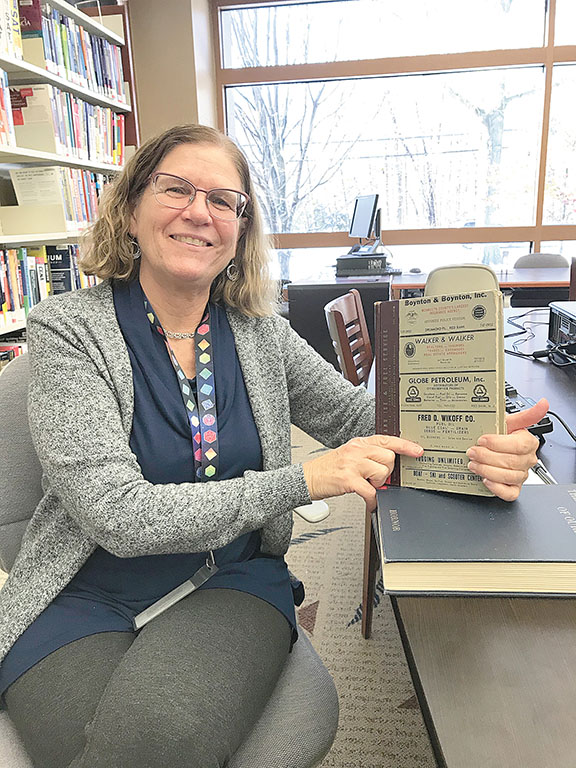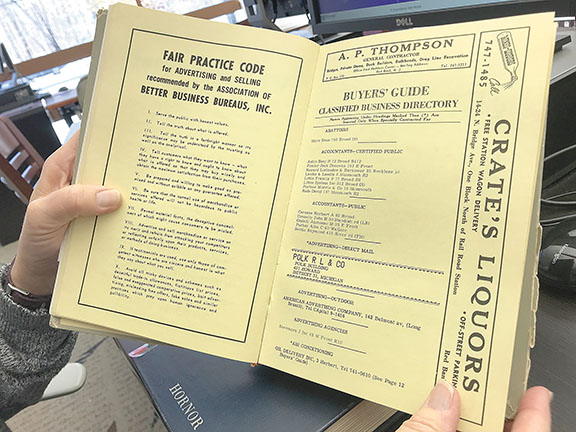By Eileen Moon

Photo by Eileen Moon
Ancestry.com says it has sold more than 14 million DNA kits.
It’s a gift that can unlock the mysteries of our individual heritage, reveal the global origins of our families and trace the path of migration that led us here. But as much as modern chemistry can reveal about our human journeys, many more keys to our family pasts lie not in the laboratory but in the library.
While you don’t need to map your DNA before you begin researching your family, it’s often the gift of a DNA test that sparks someone’s interest in learning more about their genealogy, notes Debbie Alfano, adult services librarian for the Eastern Branch of the Monmouth County Library.
“That’s how a lot of people get interested,” Alfano said. “That’s how I got interested.”
The best way to embark on a family history research project is to start asking questions and the holidays are when family members tend to get together and tell stories. The details they relate can provide the basic info you need to begin looking for records, historical accounts and even images.
The county library is an affiliate of Familysearch.org, an extensive online archive of historical records accumulated by the Church of Jesus Christ of Latter-day Saints, or the Mormon Church. “They’re very much into genealogy,” Alfano said.
Because Mormons believe that deceased family members can be assured salvation by being baptized into the Mormon faith after death, the church has collected billions of historical records from around the globe that are accessible to everyone at no charge.
The church maintains a small family history research center at 14 Reynolds Drive in Eatontown, but as an affiliate organization the library is able to access its online archives as well.
Alfano herself has used FamilySearch.org to trace her own family history.
Forced out of Ireland by the potato famine in 1847, Alfano’s great-grandfather settled in Newark where he and his wife raised nine children. “I’ve been able to locate a lot of their baptismal records by using FamilySearch.org here at the library,” she said. The bare facts of official records come to life when placed into historical context, Alfano noted. Her family arrived in America at a time when Irish immigrants were looked down on. Newark was a thriving industrial center at the time, but working conditions were dangerous and injuries and early deaths were the result.
City directories, period advertising, newspaper articles and obituaries are among the resources that can help beginning genealogists learn about their family history. “You can get so much information about how people lived,” Alfano said. Opening a local directory from 1964, Alfano pointed to the ads for businesses like roofers and accountants. Knowing a family member’s profession can help reveal facts that may be contained in the archives of professional associationsor other records.

Photo by Eileen Moon
The 1964 directory also lists long-gone department stores like Bamberger’s, Montgomery Ward and Sears, as well as several “dress shops” in downtown Red Bank and an S&H Green Stamps Redemption Store, dating from a time when people received stamps for their grocery purchases which they could save up and redeem for games, toys and household items.
The county library has computers available to the public for online research and also has subscriptions to the Library Edition of Ancestry.com, which contains billions of family history records from around the globe, and HeritagequestOnline, a genealogical database that contains historical records from more than 60 countries.
But in addition to searching online, researchers should ask their librarians for help finding local and regional resources that may contain information not available anywhere else.
Among the nondigitized resources at Monmouth County Book of the Dead, a collection of several pamphlets bearing tombstone inscriptions from 28 Monmouth County cemeteries compiled by George Castor Martin in 1915 and 1916.
There’s also a directory of burials of Monmouth County veterans dating back to the Revolutionary War. Among those recorded is Thomas Ackerson, a soldier in the Continental Army who lived from 1750 to 1839 and is buried in the graveyard at Ardena Baptist Church.
The Monmouth County Genealogy Group hosts a number of special interest groups for people of German, Irish and African American descent, as well as a First Families group for those who can trace their ancestry back before the Revolutionary War, Alfano said.
Researching obituaries can help reveal new avenues for family research. “It may say, ‘survived by a nephew’ and you realize the person you are looking at had a brother or sister,” Alfano said.
Online obituary resources accessible at the library include copies of the The Asbury Park Press and The Daily Register as well as The New York Times back to 1863. Alfano also advises checking with your town’s local history association to see what archives they have available.
In the coming weeks, the Eastern Branch will complete installation of two state-of-the-art ST Imaging ViewScan 4 microfilm readers that make it possible to view microfilm, microfiche, aperture cards, jackets, micro-cards and also scan old color slides, from which you can make and print full-color images.
And a visit to the Monmouth County Historical Archives at the county library’s Manalapan branch can reveal a wealth of information that is only discoverable through an in-person visit.
Researching your family’s past is a rewarding pursuit for just about anyone, said Alfano, who is planning to visit Toronto with her husband to explore the records of immigrants who entered the United States from Canada.
“I think, personally, it clears up any misconceptions from your family lore and the stories you were told or overheard when you were little,” she said. “A lot of the situations and difficulties our families encountered in the past are still with us in this world. It gives you an appreciation of all the hardships your family had to overcome. It gives you an appreciation of where our country has been and where it’s going.”














